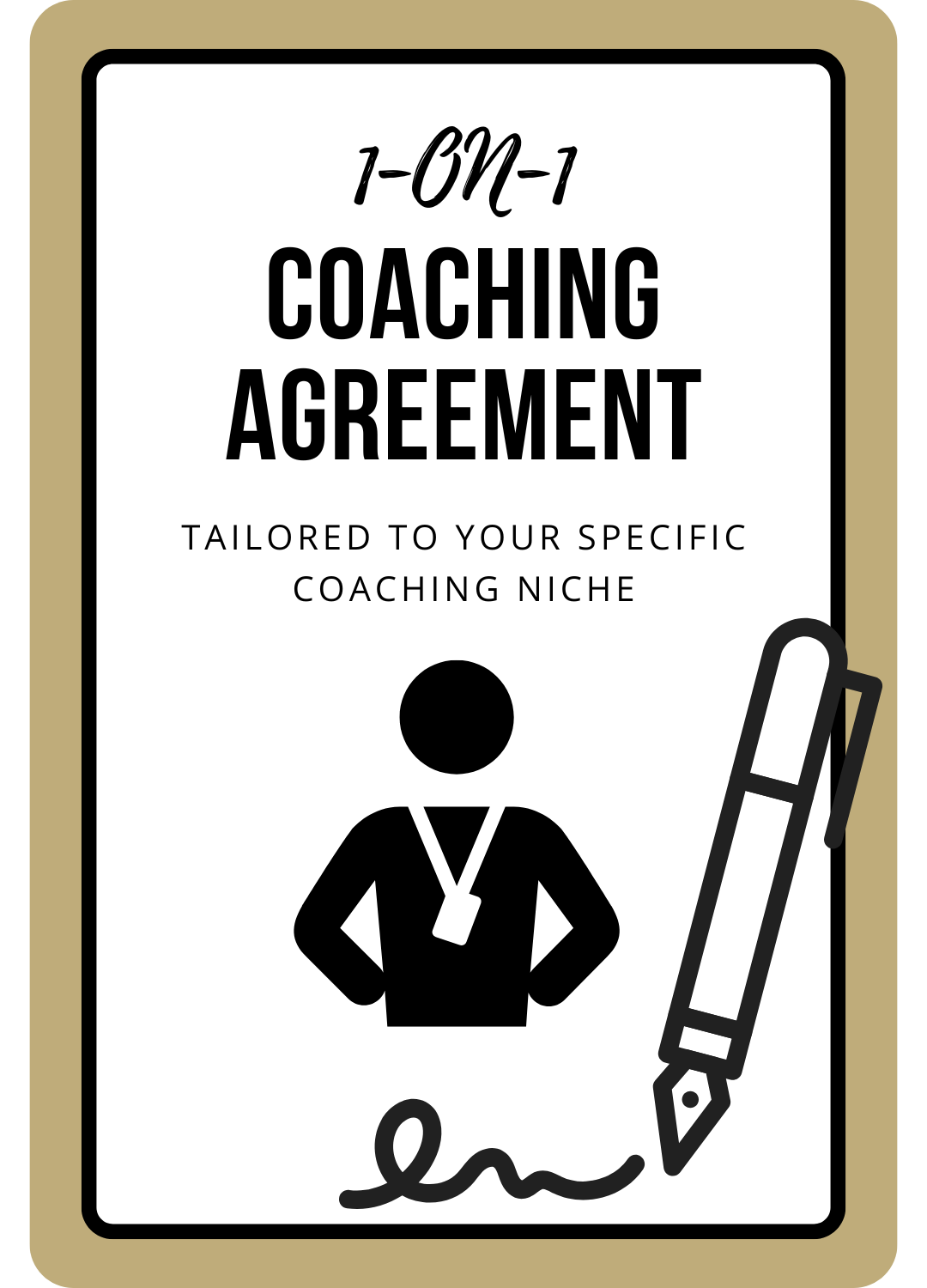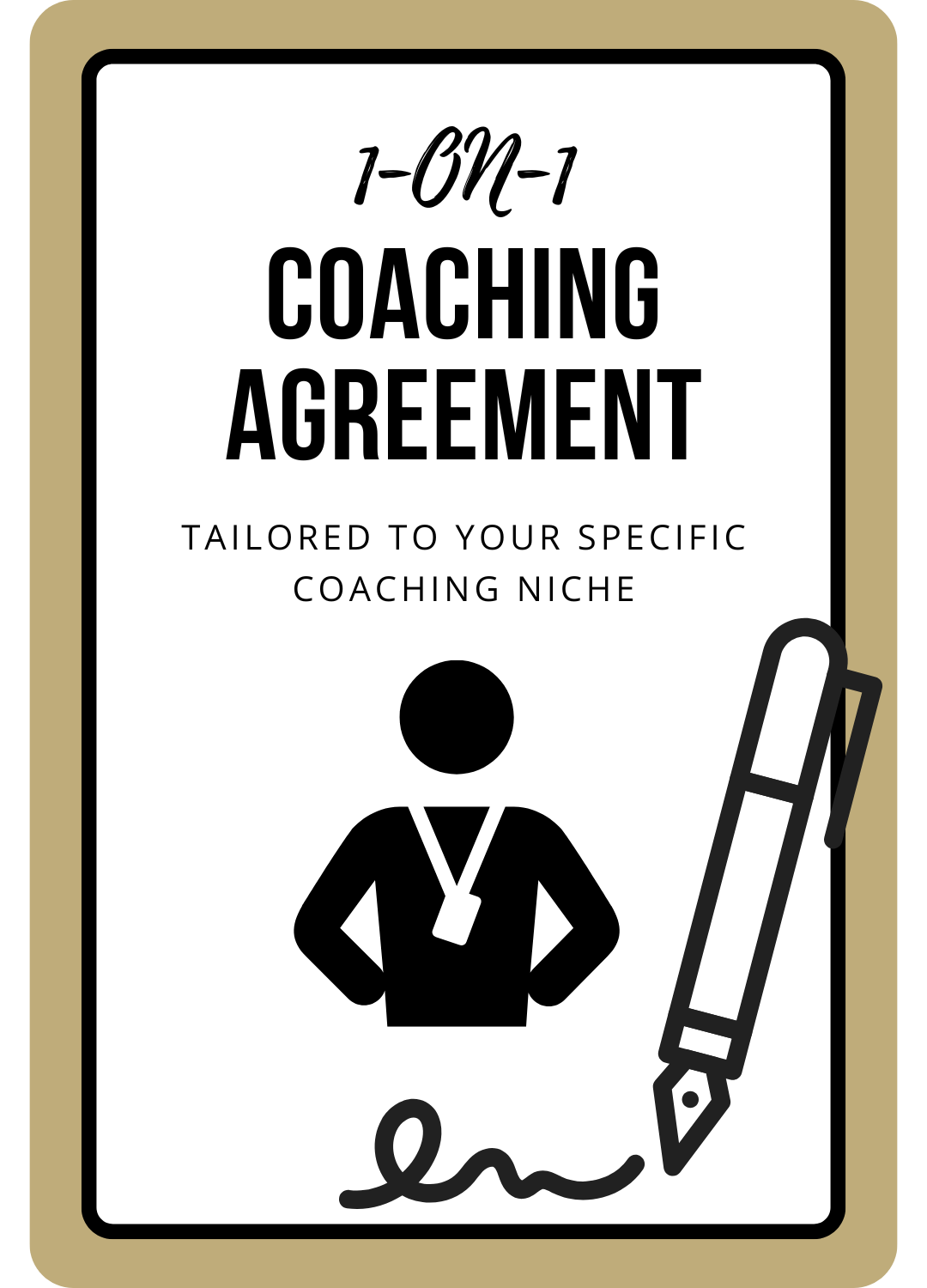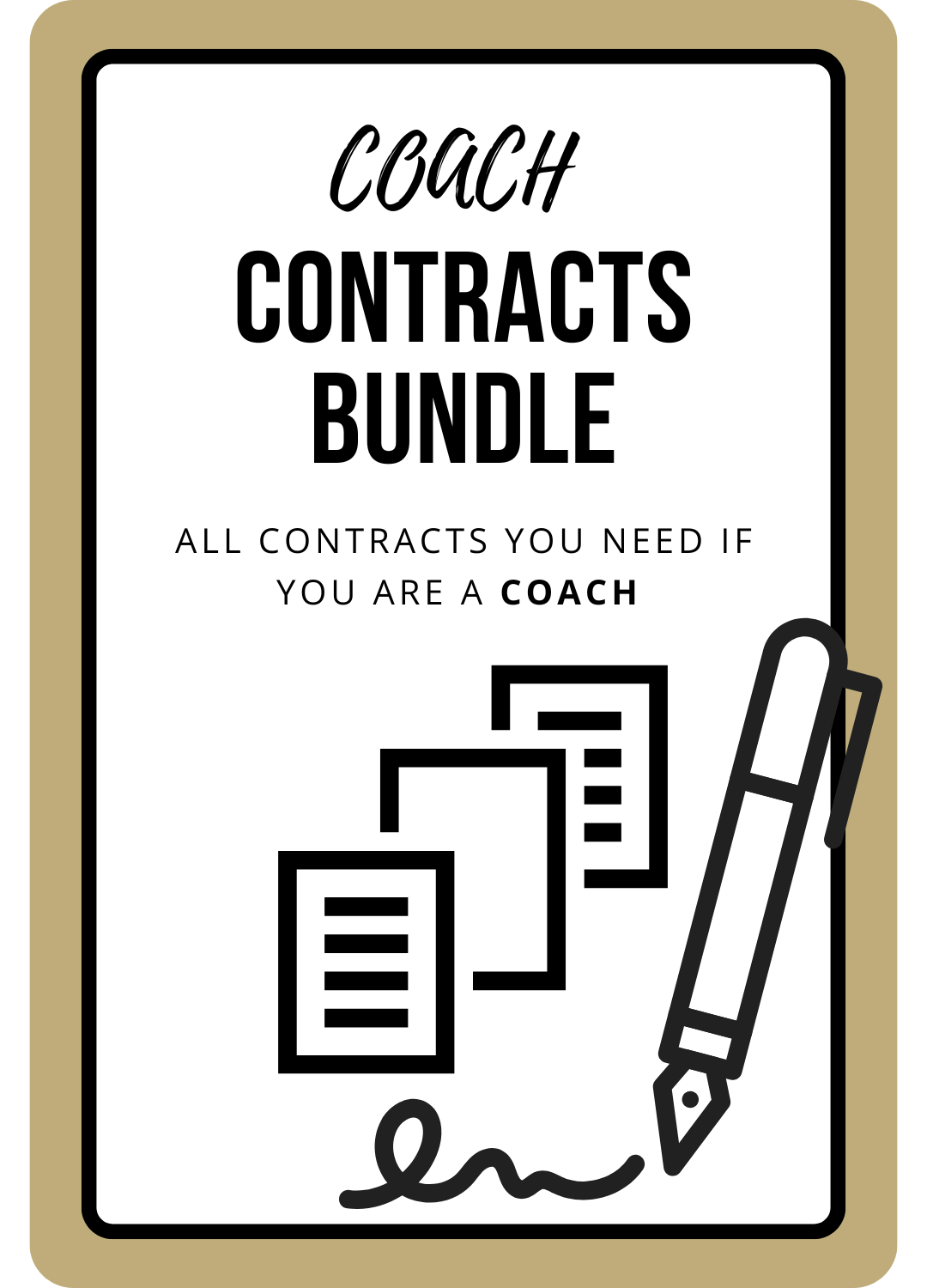The Ultimate Guide to Contracting in Coaching (Without the Awkwardness)
Is contracting in coaching really necessary — or does it just scare clients away?
You may think that sending a contract makes things feel “too formal,”. Many coaches hesitate to put agreements in place because they fear it might kill the vibe with a new client.
But done right, contracting in coaching is key to protecting yourself from misunderstandings, late cancellations, or clients asking for more than you ever agreed to give.
In this guide, we’ll cover the why, what, and how of contracting in coaching.
You’ll see the importance of contracting in coaching, what a simple agreement should include (in plain English), and the easiest types of contracting in coaching you can use without the awkwardness.
By the end, you’ll feel confident knowing that contracting in coaching is actually one of the best and simplest steps you can take—for both you and your clients.
👉 Want to skip ahead? You can grab my ready-to-use Coaching Contract Template and have a professional agreement in place within minutes.
This post is all about the simple steps to contracting in coaching to build trust, set boundaries, and keep your practice professional—without the awkwardness.
Ultimate Guide to Contracting in Coaching
1. The “Why” Behind Contracting in Coaching: The Importance of Contracting in Coaching
Coaching is built on relationships — trust, honesty, and collaboration. But even the best relationships need structure. That’s exactly what contracting in coaching provides: a framework that keeps you and your client on the same page from day one.
Many new coaches think, “If I get paid upfront, I’m safe.” Unfortunately, payment alone doesn’t protect you. Without a contract, you can still lose your money, your business reputation, and even your peace of mind.
Here are the biggest risks coaches run when they don’t use a contract:
❌ Refund demands — clients asking for their money back mid-program, even after completing sessions.
❌ Scope creep — clients expecting unlimited calls, emails, or “quick questions” outside sessions.
❌ Unclear cancellations — clients canceling last-minute and insisting you owe them make-up sessions.
❌ Boundary confusion — clients treating coaching like therapy, nutrition advice, or legal consulting.
❌ Confidentiality disputes — no clear rules on sharing sensitive information.
❌ Reputation damage — a disrespectful client making negative claims online with no clause to stop it.
❌ Professional liability — if something goes wrong, you have no written proof of what you did (and didn’t) promise.
Now flip those risks: with a coaching agreement in place, you gain…
✅ Trust: Clients see you as professional and serious. It’s actually seen as a safe and ethical practice in coaching for both sides.
✅ Clarity: Expectations are set for sessions, payments, and communication.
✅ Boundaries: Clear lines between coaching and other professions (therapy, law, nutrition, etc.).
✅ Protection: Written proof if there’s ever a disagreement.
✅ Peace of mind: You can focus fully on coaching instead of worrying about conflicts.
Professional organizations like the ICF (International Coaching Federation) and EMCC explicitly include contracting in coaching as part of ethical coaching practice. It’s not about mistrust — it’s about respect. You’re showing your client that this relationship is important enough to protect.
Mini Contract in Coaching Example (That Is Way Too Common):
Imagine you sell a 6-session package and a client pays upfront. After 3 sessions, they suddenly quit and demand a full refund, claiming they “didn’t get the results they expected.”
Without a coaching contract, you’re left with little defense. You either refund them (losing time and money) or risk a messy dispute that could hurt your reputation.
With a signed coaching agreement, you’re covered. Your refund policy is clear, your boundaries are written, and you can point to what was agreed. Instead of panic, you have peace of mind.
Think of a contract as your coaching safety net. It doesn’t make the relationship stiff or unfriendly. It’s a safe and ethical practice in coaching. It creates a safe, respectful container where coaching can thrive.
2. What a Coaching Agreement Should Cover (but Often Doesn’t): The Complete Contracting in Coaching Template
As important as contracting in coaching is, you don’t want a coaching agreement that is stuffed with legal jargon — it’s about making sure the essentials of your coaching relationship are crystal clear.
Unfortunately, many DIY agreements or free templates floating around online leave out important details that can make or break your practice.
Here’s what an ironclad coaching agreement should cover (and where most generic ones fall short):
Sessions: How many, how long, and how they’ll be delivered (Zoom, phone, in person). No more confusion about what clients are actually signing up for. That’s the main importance of contracting in coaching because most disputes are due to the scope being unclear.
Boundaries: What’s not included (therapy, medical advice, 24/7 texting, business guarantees, etc.). This prevents scope creep before it starts.
Payments and Refunds: Clear rules on when payments are due, if installments (made upfront) are allowed, and your exact refund/cancellation policies. This prevents money disputes, especially when they don’t show up for their sessions...
Cancellations and Rescheduling: What happens if a client cancels at the last-minute, doesn’t show up, or tries to reschedule too often? A solid cancellation and rescheduling policy protects your time and money.
Confidentiality: Clients need reassurance that everything they share remains private, but you also need protection if you’re legally required to disclose something.
Niche-Specific Disclaimers: Life coach? Business coach? Health coach? Career coach? Each niche carries unique risks — and your agreement should spell out exactly what you don’t do. (Contracting in coaching example: “I’m not a therapist, doctor, or financial advisor — coaching is not a substitute for professional services.”)
Professional Conduct: Clauses that require respectful behavior and non-disparagement to protect your reputation in the event a client decides to vent online.
Intellectual Property: An ironclad IP clause ensures worksheets, recordings, and methods stay yours. Clients can use them for personal growth, but can’t copy and use them for their own coaching business or online course.
Termination Rights: How either side can end the agreement. Protects you if a client is disrespectful, stops showing up, or breaches terms.
Technology + Platforms: Clients are responsible for having the right internet connection, tools, and access to join sessions—no “tech blame” or needing to reschedule because of their tech issues.
Sensitive Topics Disclaimer: Coaching conversations can touch on sensitive areas. Even if it’s a business coaching contract, you need a sensitivity disclaimer, so you’re not liable for a client’s emotional response.
Data Protection / Privacy: How you store and use client data, aligned with GDPR or other laws. It’s especially a must-have for online coaches working with clients internationally.
Contract is a safe and ethical practice in coaching—providing a safe and supportive framework where coaching can thrive.
By covering both the basics and niche-specific risks, you not only protect yourself but also give your clients confidence that they’re working with a professional.
✨ Protect Your Coaching Practice Without Drafting From Scratch ✨
Why spend hours piecing together free templates that miss the essentials? My Coaching Contract Template already includes:
✅ Clear session, payment, and cancellation terms
✅ Built-in niche-specific disclaimers for your type of coaching
✅ Boundaries and conduct clauses to protect your reputation
✅ Confidentiality and data protection aligned with safe, ethical practice
✅ Intellectual property protections for your worksheets and methods
Just fill in your details and start contracting in coaching with confidence — no awkward conversations, no legal jargon.
👉 Get the Coaching Contract Template here
3. How to Get Clients to Sign Without the Awkwardness: A Simple Guide to the 2 Types of Contracting in Coaching
Contracting in coaching doesn’t have to feel heavy or intimidating. In fact, most clients expect some kind of agreement — and when you make it easy, it becomes a natural part of your onboarding (without any awkward coaching contracting questions from clients).
There are 2 simple types of contracting in coaching: a formal written contract or terms and conditions via a form. Both work — it’s just about which method of contracting in coaching fits your style best.
Option 1: Formal Written Contract (e.g., via DocuSign or HelloSign)
Step 1. Collect your client’s details
Before you can prepare your coaching contract, you’ll need basics like their full name, address, email, and any other info that’s relevant to your services. Some coaches do this during a discovery call, while others use a short intake form.
Step 2. Prepare the agreement
Fill in your Coaching Contract Template with the client’s information and the terms you agreed on (package, price, number of sessions, start date). Keeping everything personalized makes it clear and professional.
Step 3. Send it digitally
Upload the coaching agreement into a tool like DocuSign, HelloSign, or Adobe Sign. The client receives a link, signs electronically, and you both get a copy instantly—no printing, scanning, or back-and-forth.
Step 4. Confirm and onboard
As soon as it’s signed, send a warm confirmation email:
“Thanks for signing — I’m excited to get started! Here’s how we’ll kick things off…”
This way, the contract feels like a smooth part of your welcome process — not an awkward interruption.
Option 2: Terms and Conditions via Form (Google Form, Paperbell, or Website)
Step 1. Set up your form
Create an intake or sign-up form where clients enter all the details you need for the contract — full name, address, date of birth (if relevant), email, and any practical info tied to your coaching program.
Step 2. Embed your terms and conditions
Add a link to your Coaching Terms and Conditions (plus your Privacy Policy) directly in the form. This way, everything’s in one place.
Step 3. Require agreement with a tick-box
Make it impossible to submit the form without checking “I agree to the Terms and Conditions and Privacy Policy.” That tick-box is what turns the form into a binding agreement.
Step 4. Automate your onboarding
Once submitted, you can either redirect the client to your payment page or send them a welcome email. The form captures both their information and their consent, so you don’t need to ask for details separately.
Step 5. Keep it client-friendly
Frame it as a simple onboarding step:
“Please complete this short form so we’re both clear on the details and ready to get started.”
This option makes contracting in coaching feel more natural for coaches who want to avoid sending a separate contract — everything is done in one quick step.
💡 Both options are professional and legally valid. The key is to choose the method of contracting in coaching that matches how you want your client experience to feel: a signed document for formality or a seamless form for ease.
The ULTIMATE Coaching Contract Template Set for A Safe and Ethical Practice in Coaching
At the end of the day, contracting in coaching isn’t about formality for formality’s sake. It’s about creating a safe and ethical coaching practice where you and your clients can do your best work together.
When you have a clear coaching agreement in place, you:
✅ Protect your income and time
✅ Build trust with clients right from the start
✅ Set healthy boundaries that keep your practice sustainable
✅ Align with professional standards for safe and ethical coaching
Far from scaring clients away, a contract reassures them that they’re in good hands. It shows you take your work — and their transformation — seriously.
If drafting one from scratch feels overwhelming, you don’t need to. My Coaching Contract Template includes both versions we covered here — a formal written contract (Option 1) and a terms and conditions version (Option 2). You can choose whichever style of coaching in contracting feels best for your practice and have it ready to use in minutes.
And if you’re running group programs, a website, or online courses, too? The Coaching Contracts Bundle gives you all types of contracting in coaching you’ll ever need as your coaching business grows.
This post was all about contracting in coaching — why it matters, what to include, and how to introduce it without the awkwardness so you can protect your practice and build trust with clients.
Other posts you may like:








